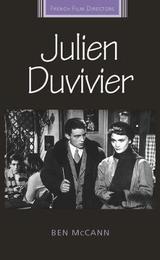
|
Julien Duvivier
Hardback
Main Details
| Title |
Julien Duvivier
|
| Authors and Contributors |
By (author) Ben McCann
|
| Series | French Film Directors Series |
|---|
| Physical Properties |
| Format:Hardback | | Pages:272 | | Dimensions(mm): Height 198,Width 129 |
|
| Category/Genre | Individual film directors and film-makers |
|---|
| ISBN/Barcode |
9780719091148
|
| Classifications | Dewey:791.430233092 |
|---|
| Audience | | General | | Tertiary Education (US: College) | |
|---|
| Illustrations |
16 black & white illustrations
|
|
Publishing Details |
| Publisher |
Manchester University Press
|
| Imprint |
Manchester University Press
|
| Publication Date |
15 February 2017 |
| Publication Country |
United Kingdom
|
Description
This book is the first ever English-language study of Julien Duvivier (1896-1967), once considered one of the world's great filmmakers. It provides new contextual and analytical readings of his films that identify his key themes and techniques, trace patterns of continuity and change, and explore critical assessments of his work over time. His career began in the silent era and ended as the French New Wave was winding down. In between, Duvivier made over sixty films in a long and at times difficult career. He was adept at literary adaptation, biblical epic, and film noir, and this groundbreaking volume illustrates in great detail Duvivier's eclecticism, technical efficiency and visual fluency in works such as Panique (1946) and Voici le temps des assassins (1956). It will particularly appeal to scholars and students of French cinema looking for examples of a director who could straddle the realms of the popular and the auteur. -- .
Author Biography
Ben McCann is Associate Professor of French Studies at the University of Adelaide -- .
Reviews'McCann's study of Duvivier argues coherently for the director's status as an auteur, particularly with its emphasis on recurring themes and its descriptive, but informative, discussions of a range of key films. This book fits well within the French filmmakers series, but can also stand individually as a case study on a long neglected director.' Gillian Kelly, University of Glasgow, Historical Journal of Film, Radio and Television, Vol. 37, No. 3 'McCann provides a wealth of information on the director's life, times and work as well as an accessible yet rigorous critical study of Duvivier's cinema which brings Duvivier into line with his other more revered contemporaries.... If, as McCann argues, Duvivier's work is ripe for re-evaluation, then this book is surely the guide to such an endeavour. Indeed, it might serve well as a companion to the revisiting of Duvivier's cinema or, for those familiar only with his best-known films, an exhaustive introduction to those films which, for one reason or another, found their way into the ashcan of cinema history. Felicity Chaplin, Monash University, senses of cinema, No. 87 (June 2018) -- .
|